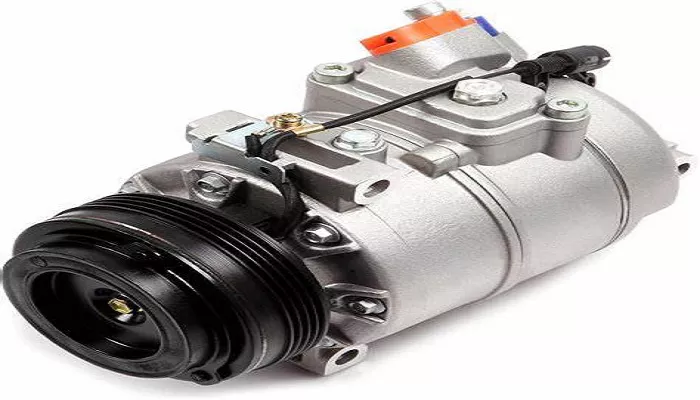The air conditioning (AC) system in a BMW is a crucial component for driver and passenger comfort, especially in extreme weather conditions. One of the most critical parts of this system is the AC compressor, which is responsible for circulating refrigerant and maintaining cool air inside the cabin.
What Does a BMW AC Compressor Do?
The AC compressor is the heart of the air conditioning system. Its main job is to pressurize and circulate refrigerant (usually R134a or R1234yf) through the AC system. Here’s how it works:
- Compression: The compressor takes low-pressure refrigerant gas from the evaporator and compresses it into a high-pressure, high-temperature gas.
- Condensation: The hot gas moves to the condenser, where it cools down and turns into a liquid.
- Expansion: The liquid refrigerant passes through an expansion valve, reducing its pressure and temperature.
- Evaporation: The cold refrigerant absorbs heat from the cabin air in the evaporator, cooling the air before it enters the vehicle.
Without a functioning compressor, the AC system cannot cool the air effectively.
Signs of a Failing BMW AC Compressor
- Weak or No Cold Air: If the AC blows warm or slightly cool air, the compressor may not be working properly.
- Unusual Noises: Grinding, squealing, or rattling sounds when the AC is on indicate internal damage.
- Leaking Refrigerant: Oil stains or refrigerant leaks near the compressor suggest seal failure.
- AC Clutch Not Engaging: If the clutch doesn’t spin when the AC is turned on, the compressor may be faulty.
- Overheating Engine: A failing compressor can strain the engine, leading to overheating.
If you notice these signs, a professional diagnosis is recommended before replacement.
Factors Affecting the Cost of a BMW AC Compressor
BMW Model and Year
- Older BMW models (e.g., E46, E90) may have cheaper compressors than newer models (e.g., F30, G20).
- High-performance models (M3, M5) often have more expensive parts.
OEM vs. Aftermarket Parts
- OEM (Original Equipment Manufacturer): Made by BMW or its suppliers, these compressors are the most expensive but offer the best fit and reliability.
- Aftermarket: Made by third-party companies (e.g., Denso, Valeo, Mahle), these are cheaper but vary in quality.
Compressor Type
- Fixed Displacement: Common in older BMWs, usually less expensive.
- Variable Displacement: Found in newer models, more efficient but pricier.
Labor Costs
- Dealerships charge more (150–250/hour) than independent shops (80–150/hour).
- The job typically takes 3–5 hours, depending on the model.
Additional Repairs
- Receiver-drier or expansion valve replacement
- Flushing the AC system
- Refrigerant recharge
These add-ons increase the total repair cost.
BMW AC Compressor Price Breakdown
| Type | Price Range | Notes |
|---|---|---|
| OEM BMW Compressor | 500–1,500 | Direct from BMW, highest quality |
| Aftermarket (Premium) | 300–800 | Brands like Denso, Valeo, Mahle |
| Aftermarket (Budget) | 200–500 | Lower quality, shorter lifespan |
| Remanufactured | 250–600 | Rebuilt compressors, variable reliability |
Labor Costs
- Dealership: 600–1,200
- Independent Mechanic: 400–800
Additional Parts & Services
- Refrigerant Recharge: 100–300
- Receiver-Drier: 50–150
- AC Flush (if needed): 100–200
Total Estimated Cost
- Dealership Replacement (OEM): 1,500–3,000
- Independent Shop (Aftermarket): 800–1,500
How to Save Money on a BMW AC Compressor Replacement
Compare Prices Online
- Check websites like FCP Euro, ECS Tuning, and RockAuto for discounts.
- Some sellers offer free shipping or warranty extensions.
Use a Trusted Independent Mechanic
- Labor rates are lower than dealerships.
- Ask for a breakdown of parts and labor costs.
Consider Aftermarket (But Avoid Cheap Brands)
- Stick to reputable brands like Denso or Mahle.
- Avoid no-name compressors that may fail quickly.
Check for Warranty Coverage
- If your BMW is under warranty, AC repairs may be covered.
- Some aftermarket parts come with extended warranties.
DIY (For Experienced Mechanics Only)
- Replacing an AC compressor requires special tools and refrigerant handling certification.
- Mistakes can lead to costly system damage.
Preventive Maintenance Tips for BMW AC Systems
- Run the AC Regularly (even in winter) to keep seals lubricated.
- Replace the Cabin Air Filter every 15,000–20,000 miles.
- Check for Refrigerant Leaks if cooling performance drops.
- Avoid Overuse on Maximum Settings to reduce strain on the compressor.
- Get Professional Inspections if you hear unusual noises.
Conclusion
While OEM parts offer the best reliability, high-quality aftermarket options can be a cost-effective alternative. Regular maintenance can prevent premature failure and save you money in the long run.
If your BMW’s AC is failing, get a professional diagnosis to confirm the issue and explore your repair options. Investing in a good-quality compressor ensures long-lasting performance and a comfortable driving experience.

